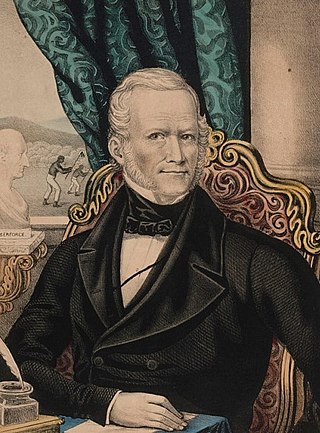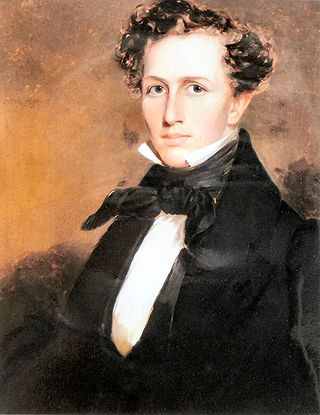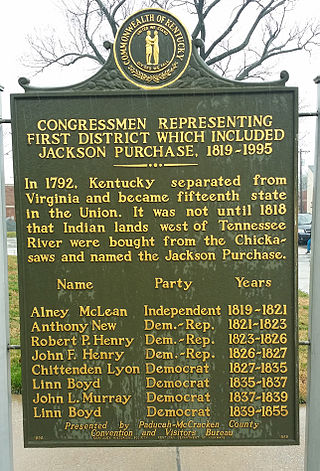Related Research Articles

Robert Ward Johnson was an American planter and lawyer who served as the senior Confederate States senator for Arkansas, a seat that he was elected to in 1861. He previously served as a delegate from Arkansas to the Provisional Congress of the Confederate States from 1861 to 1862.

James Gillespie Birney was an American abolitionist, politician, and attorney born in Danville, Kentucky. He changed from being a planter and slave owner to abolitionism, publishing the abolitionist weekly The Philanthropist. He twice served as the presidential nominee for the anti-slavery Liberty Party.

John Norvell was a newspaper editor and one of the first U.S. Senators from Michigan. He is known as one of two co-founders of The Philadelphia Inquirer, the third-longest continually operating daily newspaper in the United States of America.
Francis Swaine Muhlenberg was a political leader, member of the United States House of Representatives from Ohio, and a member of the Muhlenberg Family political dynasty.

James Brown was a Virginia-born American lawyer, planter and politician who served as a Secretary of State for the new state of Kentucky, and later as U.S. Senator from Louisiana, and Minister to France (1823–1829) before his retirement and death in Philadelphia.
Robert Todd Lytle was a 19th-century lawyer and politician who represented Ohio in the United States House of Representatives for one term from 1833 to 1835. ,

Frederic Mosley Sackett served as a United States senator from Kentucky and ambassador to Germany during the Hoover Administration.

Isaiah Rogers was an American architect from Massachusetts who eventually moved his practice south, where he was based in Louisville, Kentucky, and Cincinnati, Ohio. He completed numerous designs for hotels, courthouses and other major buildings in Boston, Massachusetts, and New York City, before that relocation.

John Rowan was a 19th-century politician and jurist from the U.S. state of Kentucky. Rowan's family moved from Pennsylvania to the Kentucky frontier when he was young. From there, they moved to Bardstown, Kentucky, where Rowan studied law with former Kentucky Attorney General George Nicholas. He was a representative to the state constitutional convention of 1799, but his promising political career was almost derailed when he killed a man in a duel stemming from a drunken dispute during a game of cards. Although public sentiment was against him, a judge found insufficient evidence against him to convict him of murder. In 1804, Governor Christopher Greenup appointed Rowan Secretary of State, and he went on to serve in the Kentucky House of Representatives and the U.S. House of Representatives.

Samuel Fenton Cary was an American politician who was a member of the U.S. House of Representatives from Ohio and significant temperance movement leader in the 19th century. Cary became well known nationally as a prohibitionist author and lecturer.

Joseph Rogers Underwood was an American politician, lawyer and judge who was a United States Representative and Senator from Kentucky.

Samuel Beardsley was an American attorney, judge and legislator from New York. During his career he served as a member of the United States House of Representatives, New York Attorney General, United States Attorney for the Northern District of New York, a member of the New York State Senate, and a justice of the New York Supreme Court.

James Clark was a 19th-century American politician who served in all three branches of Kentucky's government and in the U.S. House of Representatives. His political career began in the Kentucky House of Representatives in 1807. In 1810, he was appointed to the Kentucky Court of Appeals, where he served for two years before resigning to pursue a seat in the U.S. House of Representatives. He served two terms in that body, resigning in 1816.

Chittenden Lyon was an American businessman and politician from Kentucky. He was most notable for his service as a United States representative from 1827 to 1833.

George Dennison Prentice was an American newspaper editor, writer and poet who built the Louisville Journal into a major newspaper in Louisville, Kentucky, and the Ohio River Valley, in part by the virulence and satire in its editorials, which some blamed for a bloody election day riot in 1855. A slaveholder, Prentice initially supported Unionist candidate John Bell in the 1860 U.S. presidential election, and after the American Civil War, he urged Kentucky to remain neutral. Both of his sons joined the Confederate States Army, one dying in 1862, and Prentice's editorials lampooned Kentucky's military governor, Union General Stephen G. Burbridge. Prentice later opposed Congressional Reconstruction. He wrote a biography of Henry Clay published in 1831, an 1836 poem published in the McGuffey Readers, and a collection of his humorous essays was published in 1859 and revised after his death.

Jesse Lynch Holman was an Indiana attorney, politician and jurist, as well as a novelist, poet, city planner and preacher. He helped to found Indiana University, Franklin College and the Indiana Historical Society. He was one of the first three Justices of the Indiana Supreme Court and a United States district judge of the United States District Court for the District of Indiana.
James Sproat Green was an American lawyer who served as U.S. Attorney for the District of New Jersey from 1835 to 1850. He was the father of New Jersey Governor Robert Stockton Green.
Edward King was an American politician and lawyer. He was an Ohio legislator and twice Speaker of the Ohio House of Representatives, and was on the first faculty of the Cincinnati Law School.

David M. Camp was a Vermont attorney and politician who served as the 12th lieutenant governor of Vermont from 1836 to 1841 under Governor Silas H. Jennison.

Charles Anthony (1798–1862) was a legislative leader in the U.S. State of Ohio. He was also a Militia General during the Mexican–American War, a Masonic Grand Master for his state, and a U.S. Attorney.
References
- ↑ Knopf, Alfred A: The United States of America * A History, 1960, Page 192.
- ↑ Greve, Charles. T.; Centennial History of Cincinnati and Representative Citizens; 1904; Page 580.
- ↑ Journal of the Executive Proceedings of the Senate of the United States of ...; United States Congress Senate, 1823, Page 337
- ↑ Ohio History, Volume 29, Page 231 - Online website. In the late 1830s he edited a weekly newspaper, the Kentucky and Ohio Journal.
- ↑ Catalogue of the Officers and Students in the Medical and Law Departments of Cincinnati College, 1835-1836; Board of Directors, 1836
- ↑ Wesenberger, Francis; The History of Ohio, 1825-1850; The Ohio State Archeological and Historical Society; (1941); Page 379